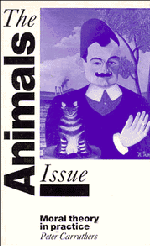Book contents
- Frontmatter
- Contents
- Preface
- 1 Moral argument and moral theory
- 2 Utilitarianism and contractualism
- 3 Utilitarianism and animal suffering
- 4 Utilitarianism and the harm of killing
- 5 Contractualism and animals
- 6 Animals and rational agency
- 7 Contractualism and character
- 8 Animals and conscious experience
- Conclusion
- Notes
- Index
7 - Contractualism and character
Published online by Cambridge University Press: 03 May 2011
- Frontmatter
- Contents
- Preface
- 1 Moral argument and moral theory
- 2 Utilitarianism and contractualism
- 3 Utilitarianism and animal suffering
- 4 Utilitarianism and the harm of killing
- 5 Contractualism and animals
- 6 Animals and rational agency
- 7 Contractualism and character
- 8 Animals and conscious experience
- Conclusion
- Notes
- Index
Summary
In this chapter I shall confront the problem left over from Chapter 5, arguing that there is a way in which contractualism can accommodate duties towards animals that is independent of the question of offence caused to animal lovers. I shall then investigate just how extensive these duties may be, on the resulting account.
JUDGING BY CHARACTER
The general thesis I want to defend in this section from a common-sense perspective is that some actions are seriously wrong, not because they cause any harm or violate any rights, but simply because of what they reveal about the character of the agent. I shall later go on to argue that this thesis is not only correct, but fully explicable within contractualism. It will then turn out that some ways of treating animals are morally wrong, just as common sense tells us, but only because of what those actions may show us about the moral character of the agent. This will then be a form of indirect moral significance for animals that is independent of the fact that many rational agents care about animals, and hate to see them suffer.
Consider the example of Astrid, the astronaut, once again. Suppose, as before, that she has set her craft irreversibly to carry her out of the solar system, and that she is travelling with her cat and her grandfather. Now, at a certain point in the journey the grandfather dies.
- Type
- Chapter
- Information
- The Animals IssueMoral Theory in Practice, pp. 146 - 169Publisher: Cambridge University PressPrint publication year: 1992



